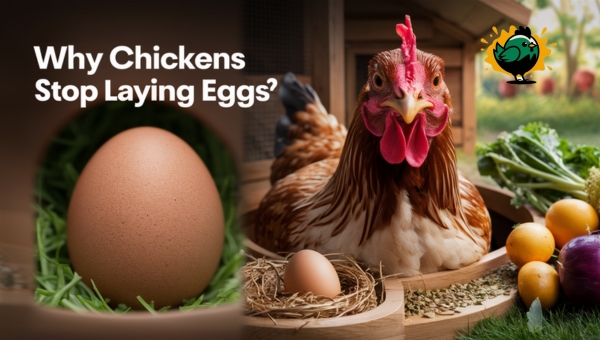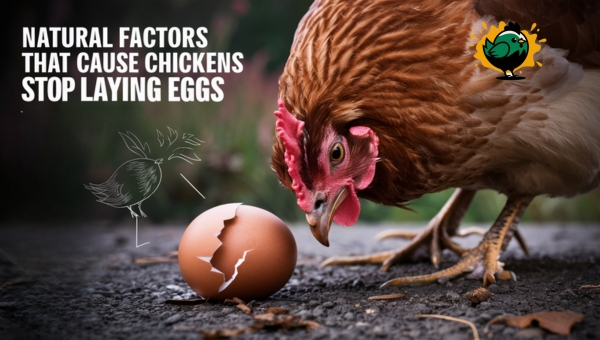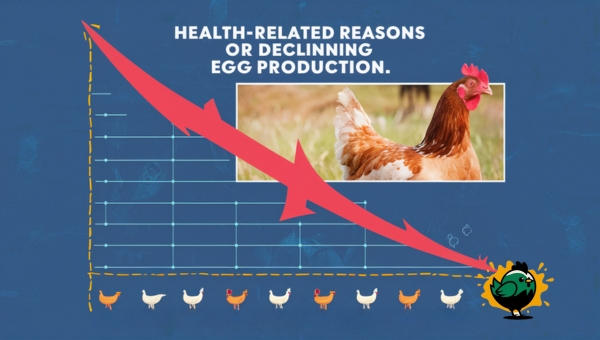Why Chickens Stop Laying Eggs – Key Factors Explained

You eagerly check the nesting boxes, hoping to collect fresh eggs, but they’re empty. Frustration sets in. You wonder, “Why do chickens stop laying eggs?” This common issue can bewilder even seasoned poultry keepers.
But don’t worry, we’ll explore natural, environmental, and health-related reasons why hens may halt egg production. Understanding these factors can help you manage your flock better and keep those eggs coming.
Natural Factors That Cause Chickens Stop Laying Eggs
Chickens are influenced by a variety of natural factors that can lead to a decline in egg production. Understanding these factors is crucial for maintaining a healthy flock and ensuring consistent egg yield.

- Age: As hens mature, their egg production naturally declines. Most hens begin laying eggs between 18 to 22 weeks of age, reaching peak production around 6 to 8 weeks later. After about a year, production typically drops to around 65%.
- Molting: Molting is a natural process where hens shed old feathers and grow new ones, often leading to a temporary halt in egg production. This usually occurs annually and can last several weeks to months.
- Seasonal Changes: Hens are sensitive to changes in daylight. As days shorten in fall and winter, egg production may decrease unless supplemental lighting is provided.
- Stress: Stress from various sources—such as overcrowding, changes in routine, or predator threats—can negatively impact a hen’s ability to lay eggs. Stress management is essential for maintaining productivity.
Also Read: Boo Boo Chicken – How to Care for Injured Chickens?
Environmental Factors Influencing Egg Production
Environmental conditions play a significant role in the overall health and productivity of laying hens.

Key factors include:
- Temperature: Optimal laying temperatures range from 11°C to 26°C. Higher temperatures can lead to decreased feed intake and egg production, while extreme cold can also hinder laying.
- Humidity: High humidity levels (above 75%) can negatively affect egg production by causing heat stress and reducing feed intake.
- Lighting: Hens require about 14 hours of light per day for optimal egg production. Insufficient light can lead to decreased laying rates and may trigger molting.
- Ventilation: Proper airflow is crucial for maintaining an ideal environment. Poor ventilation can lead to ammonia buildup and respiratory issues, further impacting egg production.
Health-Related Reasons for Declining Egg Production
When chickens stop laying eggs, health-related issues are often the culprit. These can range from infections and parasites to reproductive challenges and behavioral conditions like broodiness. Understanding these factors is essential for maintaining a productive flock.

Illness and Parasites
Common illnesses and parasites can severely impact egg production:
- Infections: Diseases such as avian influenza or infectious bronchitis can lead to reduced laying rates.
- Parasites: External parasites like lice and mites can cause stress and weaken hens, leading to decreased egg output.
Prevention and Treatment Tips:
- Regularly inspect birds for signs of parasites.
- Maintain clean living conditions.
- Administer appropriate vaccinations and treatments as needed.
Reproductive Issues
Reproductive problems can also hinder egg-laying capabilities:
- Egg Binding: This occurs when an egg becomes stuck in the oviduct, causing distress and preventing further laying.
- Internal Laying: Sometimes, eggs can form inside the hen rather than being laid, which can lead to serious health complications.
Management Tips:
- Ensure proper nutrition with adequate calcium and protein.
- Monitor hens closely for signs of distress or unusual behavior.
Broodiness
Broodiness is a natural instinct where hens stop laying eggs to incubate their eggs:
- Behavioral Changes: Broody hens will often sit on nests, refusing to leave, which halts egg production temporarily.
Management Strategies:
- Remove broody hens from nesting areas.
- Provide distractions or separate housing if necessary.
Also Read: Fairy Eggs | A Chicken Keeper’s Guide to the Oddities
How to Encourage Egg Production in Chickens?
If you’re eager to boost egg production in your chickens, there are several strategies you can adopt to ensure your flock is healthy and productive.
Let’s dive into some effective methods.
- Balanced Nutrition: Ensure that hens receive a well-rounded diet rich in protein, calcium, and energy. Avoid imbalanced feeds like table scraps that may lead to nutritional deficiencies.
- Adequate Water Supply: Fresh water should always be available, as dehydration can quickly reduce egg output. Hens typically drink twice as much water as the weight of feed consumed.
- Lighting Management: Implement artificial lighting during shorter days to extend the light period. Aim for 14–16 hours of light daily during winter months.
- Stress Reduction Techniques: Minimize stress by providing adequate space, maintaining a consistent routine, and ensuring good flock dynamics. Regularly check for signs of stress among hens.
By addressing these natural, environmental, and health-related factors effectively, chicken keepers can help ensure consistent egg production throughout the year.
FAQs
Can stress permanently affect a chicken’s egg production?
Stress can temporarily reduce egg production, but it typically does not cause permanent damage. Addressing the cause of stress and providing a calm environment usually helps chickens resume normal laying.
What should I feed chickens to help them lay eggs?
Chickens should be fed a balanced diet rich in protein, calcium, and essential nutrients. Layer feed specifically designed for egg-laying hens is optimal for maintaining consistent egg production.
At what age do chickens naturally stop laying eggs?
Chickens generally start to decrease their egg production significantly around the age of 2-3 years. While some hens may continue to lay sporadically, the number of eggs produced tends to decline with age.
Conclusion
Understanding the factors that cause chickens to stop laying eggs can help you maintain a productive flock. From natural processes like aging and molting to environmental conditions and health issues, each element plays a crucial role in egg production. By addressing these factors methodically, you can optimize conditions for your hens, ensuring a steady supply of eggs.
To explore more insights on poultry care and egg production, check out our other articles. Stay informed and keep your flock thriving!
